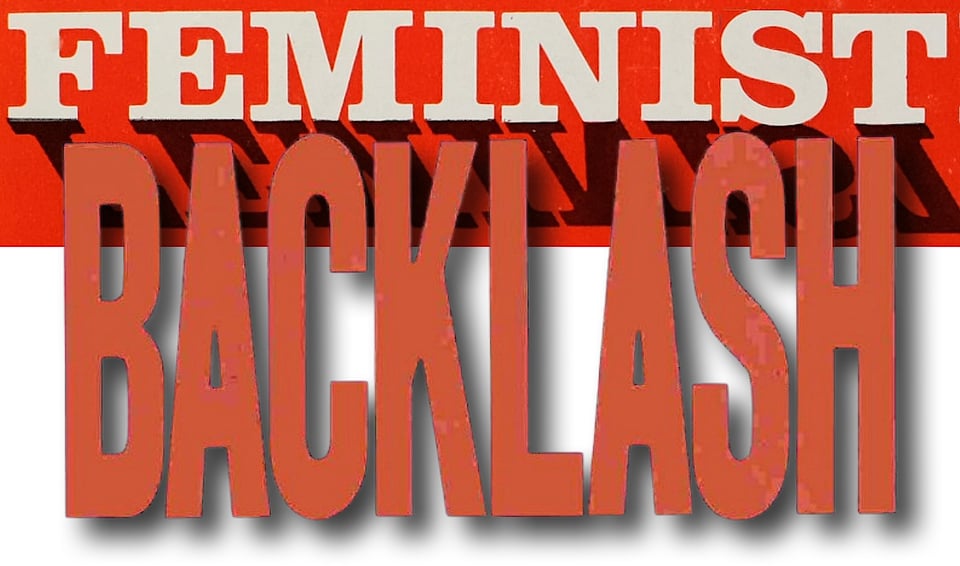Make Way For the Feminist Backlash: A Chat with Moira Donegan


This whole election smacks of gender. It's a referendum on women's humanity and bodily autonomy, up against the crudest misogyny on offer—primarily from the Trump camp, although misogyny, as ever, is transpartisan.
To help me wrap my brain around what's at stake, I called up Moira Donegan, a feminist intellectual whose work I’ve long admired, and longtime friend of the Sword & the Sandwich. Moira is an opinion columnist covering gender and politics at The Guardian, and writer-in-residence at Stanford’s Clayman Institute for Gender Research.

TL: Okay, so how are you feeling in the run-up to the election, as a woman, a feminist, and a human being?
MD: How do I feel? I feel like shit. Not necessarily in terms of election prediction, but just in terms of the psychic toll that working as a journalist during the election season can take on you. It's a lot. It's very high stakes. There are a lot of people who I care about who are imperiled by the results of this election, a lot of issues I care about that are imperiled by the results of this election. And there's also come to a point where there's just nothing more to be done. So much of this is outside of anybody's individual control, so you're just waiting to see if the ruling will come back as clemency or execution. And that's sort of all that there is to do right now.
TL: It’s, like, cool, we're watching a train irresistibly drawn towards a divergence point: will it enter the boiling hot lake of lava or will it do something else? But separately, I think you and I both had some frustrations we've been sharing with each other, in the feminist cabal chat that sets the agenda for wokeness every day. Just kidding.
MD: If only.
TL: That's just me texting Moira at like two in the morning being like, “and another thing, I was annoyed by today.” I think obviously this is a landmark election for feminist issues, for women’s bodily autonomy. We're really seeing the full horror of the post-Roe years, and the election is to some extent a referendum on those. And, and yet you and I have both noted that there's this persistent perception that feminist concerns are unserious. There’s a pervasive minimization of these concerns about these incredibly both pertinent and stark issues of women's bodily autonomy.
MD: Yeah, you know, this is an election about gender that a lot of people won't admit is an election about gender, right? So we have, if you can trust the polls—which you can't—there does seem to be some evidence suggesting that this is the greatest gender divide in our voting that we've ever had, in party affiliation that we've ever had. Men are going to the Republicans in numbers higher even than they previously were, and women are overwhelmingly going to the Democrats, right?
We have the first presidential election happening after the Roe decision, which really reshaped women's health access, their ability to control their own bodies, and lives in a lot of ways, but also was really a de-legitimization of women's status in this country.
Like, we do not have an Equal Rights Amendment. What we had instead was Roe, which was the heavily overladen and symbolic guarantee of women's equality in our law, and that is now gone. The consequences of that inequality are beginning to be felt in a lot of these tragic stories you hear about deaths and near deaths from abortion bans in states that have them. But also it's going to be much longer-term, as women are driven out of the workforce, as they are pushed out of public life. Women who need abortions and can't get them in addition to women who never need one find themselves more and more isolated, as those mentors that they have, those peers that they would have had, disappear from their industries and from the American polity. And that is a generational shift.
What you also have is a real realignment with men. We have this kind of long-standing slow-simmering political crisis of male gendered resentment, and that is something that is because of not only women's large-scale entrance into the workforce and into higher-paid, higher-status jobs, and not only a result of women becoming much more visible in public life during the Roe era and subsequent decades, but also because of the simultaneous decline in the industrial economy. So you have this big cultural and economic shift of women having higher and higher status and more and more independence, and then you have this simultaneous withdrawal of the industries that had provided renumeration, employment, and also dignity and meaning for large sectors of men. And those two simultaneous trends, which are really half a century in the making, have led to the sense of intense grievance over status, and and wounded entitlement on behalf of men—who are often really taking this frustration out not on the bosses, not on the economic forces that deny them dignity, but on the women who they feel have usurped their place.
These men have a real champion in Donald Trump, who is a misogynist and is accused of sexual violence by tons of women, and who has been able to achieve his status through a kind of domineering misogyny that emasculates other men and really violently degrades women. And I think that is not a bug not for Trump's success in this race, that is a feature.
TL: Oh yeah, absolutely. I mean, this is a choice. It's the first election since women were formally legally stripped of their bodily autonomy in this nation, and the choice is between the first female president and a rapist.
It really could not be more stark, and yet, for political reasons that are understandable, neither Kamala Harris nor anyone else is emphasizing just how gendered this election is. I mean, there has been a gratifying focus on abortion rights, but that particular element just doesn't surface. You know, it's this idea that talking about rape, talking about feminism, is toxic. It's not a winner, so let's run away from it.
And then, meanwhile, for a lot of women I know, one really significant element of this election is, and certainly for me, is this feeling of like, “I cannot, I will not be able to psychically handle it if my country elects a rapist over a woman again.” Like, that will be just such a profound blow.
MD: It'll be a horrific blow to every woman's dignity. It'll be a horrific blow to every woman's sense of safety. I mean, I think it was central to the political trauma of 2016 that Trump's victory came that year just a few weeks after the release of the Access Hollywood tape, right?
You know I always cover my ass by calling him an alleged rapist, an alleged sexual assault perpetrator, right? But not only has he has been adjudicated by a jury in the years since 2016 to have committed sexual violence, but he also brags about it.
TL: Yeah, I mean, we have him on tape saying, I grab women by the pussy. It's not ambiguous.
MD: Exactly. This is something he is boasting about. He is proud of it. He understands it is constitutive of his masculinity, right? It is not a secret shame. It is something that he considers an affirmatively desirable part of his own identity and character.
TL: And in many ways he's right. We see that in the raced and gendered attacks against Kamala Harris from his campaign where his pitch is at odds with reality. Like his pitch is she's stupid, you know, and all too often white male commentators in the media are parroting this idea that she's incoherent or dumb, when her opponent can't put together a sentence to save his life. What we have here is a referendum on women participating in public life, on women's intelligence, on, you know, “are women suitable to lead?”
The Sword and the Sandwich is a newsletter about deadly serious extremism and serious sandwiches. Please consider supporting this work with
a paid subscription.
This whole thing smacks of gender. And from my angle, obviously, I'm thinking about the religious aspects. I'm looking at how the MAGA movement is so, so tightly tied to a religious movement that has quite successfully sought to vanquish feminism and curtail women's freedoms for the last half century—the evangelical movement, the Christian right. And they've really had some phenomenal successes in that terrible arena. But there is also, you and I have both noted, a specific criticism from the left, that if you vote for Harris, you are—as one person told me—a “handmaiden of genocide.” An enabler of genocide, because of the Biden administration’s position on Gaza.
MD: I would just say the vote is not only a referendum on the Biden administration and its position on foreign policy, Gaza in specific. It is also a referendum on the place of women in public life.
TL: I.e.: do they have any?
MD: Right. Are they free to control their own bodies? I think people are sort of convincing themselves that Trump won’t institute a national abortion ban, and I'm here to tell you that he will, and he doesn't have to work very hard or have Congress on his side to do so.
It is also a referendum on trans kids. Trump has gone really, really hard in the last, waning sunset weeks of the campaign on transphobia, right? It is also a referendum on whether we are going to reward racism of the kind that Trump has leaned into. It is a referendum on whether we want to continue to have a republican—small r republican—form of elected government that is in any way accountable to electoral checks.
So I share the rage at the fact that we do not have a candidate right now who has a simple chance of winning, who has what seems to me a principled or even humane stance on the cause of war. It is infuriating, and is a sincere injustice that that issue has been removed beyond the reach of the electoral check. That sucks. However, it does not mitigate the moral urgency of abortion access, of trans rights, of anti-racism, of democratic government, of the struggle to transform into a self-governing country of equals.
You know, that is a struggle that I still believe in, and I still want to work towards. And that's why I have made the decision to vote for Kamala Harris. And that's what I'll be doing. I think the moral salience of voting for a candidate who might be flawed—or who we don't agree with on anything or might even have committed some grave moral missteps—I do think that that moral salience gets amplified when the candidate is a woman. People are saying right now, “I don't know that I can vote for Kamala Harris.”
TL: And when the central, moral issue at play is about women's rights and the rights of gender minorities, these are viewed as sort of fundamentally unserious issues. And I'm like, they're deadly serious in the most literal sense. Women are dying right now. Not in some hypothetical future, but right now.
MD: In needless ways. And their moral urgency does tend to get brushed aside in these conversations.
TL: So it's this idea that if you care about women's lives, it’s this frivolous or decadent concern, which is so profoundly insulting.
MD: Talia, I've been told that women are bourgeois, actually.
TL: Yeah, it’s bourgeois that I have a fucking uterus, I'm sorry, I didn't buy that at like Macy's, I was born with one and now it's a controlled substance in half the states in the nation.
What are you talking about? I do wind up getting mad, and then I also think—and I know this is not exactly a new observation—that it is remarkable how deeply, deeply uncomfortable people become when women's rage becomes a politically salient factor.
I think there are so many misogynistic assumptions that the people are not even necessarily aware of when they're searching within themselves and addressing politics through this lens. But I think it's this idea of that women should be like concerned with the domestic sphere and not politics.
I mean, it's crazy how much these revanchist gender ideas permeate all aspects of the political spectrum, because misogyny is a project, much like other forms of prejudice, that doesn't have a single political home. Because it is imbued in every aspect of our culture, it takes many different forms. And that can be leftists dismissing or even harassing women who are intending to vote to save their own lives.
And obviously the entire project of the right is just one giant misogyny fest, with this cartoonish fascist hypermasculinity situation, from Hulk Hogan to the crassest, dumbest, 90s-sitcom “women be shopping” shit.
MD: And don't forget about JD Vance's aggressive pro-natalism really being not even merely distasteful but quite explicit in the claim that women's value is exclusively in childbearing.
TL: Oh yeah, JD “breed, you sow” Vance. He's so horrible. We're also talking about a party that has openly advocated banning no-fault divorce. Vance has specifically talked about the idea that women should stay in violent marriages. That is something he has said, that even the idea of family is sacred, and thus more important than the real lives of women. And I have seen that rhetoric so much in the religious stuff I've been reading.
So obviously it's very salient in my mind at this moment, but it's also very explicitly part of the Republican platform. And I find that so, so chilling. This is the third time in a fucking row that we're having to deal with an election where our basic humanity—like, are you fully human or not—is the top line question on the ballot. And the degree to which it is demoralizing, dispiriting, exhausting is wild. I think many of us are still contending with this ongoing trauma that has started in 2015 and never stopped.
MD: I think one thing I would want to remind you of, Talia, is that, as much as the media and some of these circles that we run in and that are very visible on the left like to downplay women's concerns, and as much as the notion that women voting in the service of their own equality and their own dignity and their own freedom is somehow illegitimate has gained traction, I will also point you to history and say that women can issue a backlash too.

Feminists make our own backlash when we are insulted and attacked like this, right? So after Trump won the week of the Access Hollywood tape, there were the women's marches, which were mocked, but they were massive. There was the Me Too movement. There were huge mobilizations of women in the 2018, 2020, and 2022 elections. After Dobbs, every polling model had the Republicans winning a “red wave” in those midterms.
And what happened instead is that women showed up to vote and to reclaim their own dignity. So the backlash is a way we can also take it up ourselves.
TL: Hell yeah. Also record numbers of female candidates running for office. We had the most women in Congress ever, I believe, in 2018. So yeah, it does go more than one way. And thank you for saying that. And thank you for speaking to me.

-
This conversation was a balm to read in the run up to the election. Thanks to both of you for this post and for doing what you do!
Add a comment: